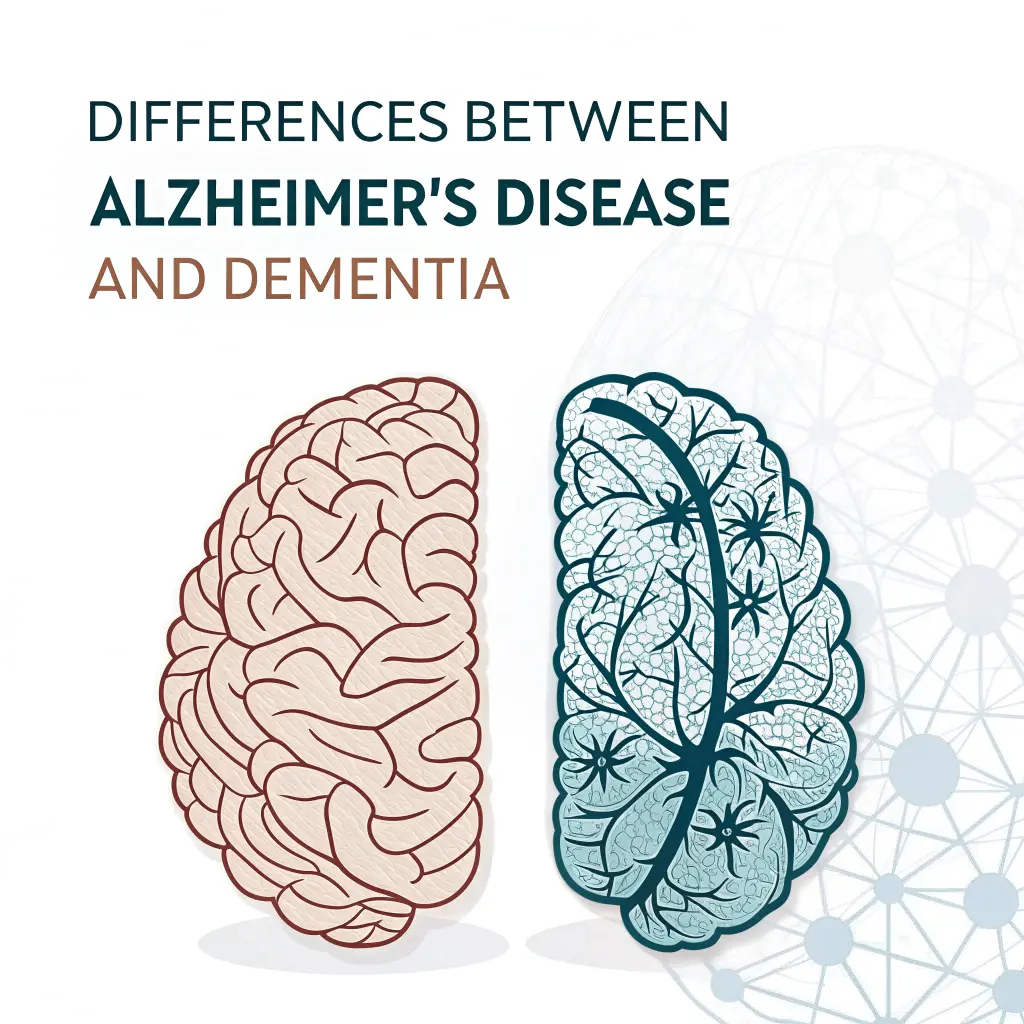When it comes to cognitive decline, terms like “dementia” and “Alzheimer’s” are often used interchangeably, though they refer to different medical conditions. Dementia serves as an umbrella term for a range of neurological conditions, with Alzheimer’s disease standing as a specific type under this broad category. Understanding the distinction between the two is crucial not just for medical professionals but for patients and their families as they navigate diagnoses and treatments. In this article, we aim to illuminate these differences and provide clarity on the two terms.
Understanding the Synergy and Contrast Between Alzheimer’s Disease and Dementia

Clarifying the synergy and contrast between Alzheimer’s disease and dementia is fundamental in grasping their relationship. Dementia is a general term for the loss of memory, language, problem-solving, and other thinking abilities that are severe enough to interfere with daily life. Alzheimer’s disease is the most common cause of dementia, accounting for 60-80% of cases.
While all Alzheimer’s patients have dementia, not everyone with dementia has Alzheimer’s. There are several other forms of dementia, including vascular dementia, which occurs after a stroke, and Lewy body dementia. Each type has its own underlying etiology and disease progression, which results in different symptoms and treatment approaches.
For more information regarding the differences and similarities of dementia versus alzheimer’s, one should consult healthcare professionals who can provide tailored insights based on the patient’s specific medical history and condition.
Exploring the Specifics of Alzheimer’s Disease
Alzheimer’s disease is a neurodegenerative condition characterized by the abnormal buildup of proteins in and around brain cells. One of the proteins involved is called amyloid, deposits of which form plaques around brain cells. The other protein is tau, which forms tangles within brain cells. These changes are believed to damage and kill brain cells, causing the debilitating symptoms of the disease.
Memory loss is the most common sign of Alzheimer’s disease. Early signs may include difficulty in recalling recent conversations or events. As the disease progresses, symptoms can include problems with language, disorientation, mood swings, and loss of motivation. However, each individual will experience symptoms and progression of Alzheimer’s uniquely.
The progression of Alzheimer’s disease is often divided into three main stages: preclinical (before symptoms appear), mild cognitive impairment (when symptoms are mild), and dementia. Unfortunately, because Alzheimer’s disease is progressive and incurable, it leads to severe impairments and, in most cases, requires comprehensive caregiving arrangements as time goes on.
Diagnosing and Treating Alzheimer’s vs. Other Dementias

Diagnosing the different forms of dementia involves a combination of medical history assessment, physical examination, brain imaging, and cognitive tests. A solid diagnosis of Alzheimer’s or another dementia type requires a comprehensive evaluation from a neurologist or a geriatrician, who will distinguish between the various dementias based on symptom presentation, progression, and imaging findings.
Treatment for dementia is as varied as its types. For Alzheimer’s, medications such as cholinesterase inhibitors and memantine can help improve symptoms or slow down their progression. Non-drug therapies, including cognitive stimulation and lifestyle changes, can also complement medical treatments. In contrast, dementias caused by vitamin deficiencies or thyroid issues may be treated with supplements or hormone replacement therapy.
Another significant aspect resides in early diagnosis, which can provide a vital time window for treatment and planning. Cognitive training, establishing routine, and legal planning become part of a proactive approach to living with these diseases. Healthcare professionals can guide patients through therapy options, which might include medications alongside physical and cognitive exercises.
Navigating the Emotional and Social Implications of Dementia and Alzheimer’s

The emotional and social implications of both dementia and Alzheimer’s disease are profound. For the individual, the loss of independence and previous capabilities can lead to feelings of frustration, anxiety, and depression. Alzheimer’s can change a person’s personality and behavior, often causing a strain on personal relationships and necessitating changes in family dynamics.
Caregivers face their own set of challenges, including emotional stress, physical exhaustion, and financial strain. Support groups, respite care, and counseling can be invaluable resources for caregivers to manage these demands. Creating a support network and educating oneself about the disease are pivotal steps in dealing with the emotional responsibilities.
Altogether, distinguishing between Alzheimer’s disease and dementia is essential for accurate diagnosis, effective treatment, and proper care. Overall, while understanding the medical nuances is vital, recognizing and addressing the emotional and social aspects will ultimately determine the quality of life for individuals with dementia and their caregivers.
